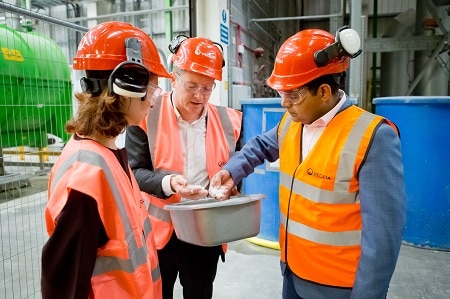Veolia targets ‘high quality’ HDPE at Dagenham bottle plant – Veolia HDPE Dagenham bottle plant - Arhive
Veolia HDPE Dagenham bottle plant Veolia HDPE Dagenham bottle plant Veolia HDPE Dagenham bottle plant Veolia HDPE Dagenham bottle plant Veolia HDPE Dagenham bottle plant Veolia HDPE Dagenham bottle plant
Veolia targets ‘high quality’ HDPE at Dagenham bottle plant
Veolia officially reopened the plastic milk bottle reprocessing plant in Dagenham yesterday (19 September), which the company has said will produce around 10,000 tonnes of high quality food grade HDPE pellets annually.
The Dagenham Plastics Facility, which recycles milk bottles into HDPE pellets, was acquired by the waste management company in June last year and is now operating at full capacity.
(l-r) Estelle Brachlianoff, senior executive vice-president of Veolia UK & Ireland, Richard Kirkman, chief technology & innovation officer at Veolia UK and Ireland, and Rajesh Agrawal, deputy Mayor of London for business
The recycling plant had previously been owned by plastics recycling firm, Closed Loop, but the company was placed into administration in 2015, with the business having posted losses due to challenging trading conditions.
According to Veolia, recycling reprocessing HDPE bottles requires 75% less energy to make a plastic bottle than using ‘virgin’ materials. The company said this equates to conserving enough energy to power around 20,000 homes and saving 10,000 tpa of carbon emissions annually.
Applications
The recycled HDPE from the facility is used for a range of applications, including laundry bottles, drink bottles, cosmetic bottles and milk bottles.
At the plant, plastic is sorted and processed using three vacuum extrusion lines. The five stage process involves: hot washing, colour sorting, vacuum decontamination, melt friction and extrusion into pellets. The pellets then undergo ‘rigorous’ testing to ensure each pellet meets the standards of quality for food packaging.
Estelle Brachlianoff, senior executive vice president of Veolia UK & Ireland, comments: “I’m a firm believer that the solution to making all plastics easily recyclable and increasing the percentage of recycled material in packaging lies in collaboration.
“And as the public’s awareness of packaging and recycling continues to rise we hope to see more of the supply chain working together to solve the packaging puzzle.”
Opportunities
The opening was attended by Rajesh Agrawal, deputy Mayor of London for Business. Mr Agrawal said: “London continues to be the leading destination for European companies looking to scale up. There are many opportunities for businesses in London’s outer boroughs and Veolia’s investment in Dagenham will bring jobs and prosperity to the area.
“The Mayor is committed to helping Londoners recycle more and waste less, as we aim for 65% recycling by 2030. This facility is an example of the circular approach to using resources Sadiq has adopted. By taking London’s plastic bottles and reprocessing them in the capital we’re keeping valuable resources circulating and creating value in the local economy.”
Above: A video showing the process which plastic goes through at the Dagenham facility (Video: Veolia)
Veolia said the move is creating 30 permanent jobs in London and enabling the company to make and sell a high value product from the 200 million plastic milk bottles it collects annually.
In 2012, the company invested over £6.5m in a Plastics Recovery Facility in Rainham, which sorts different grades of plastics. HDPE from Rainham will be supplied to the new facility in Dagenham. (see letsrecycle.com story)
The company said the facility allows it to ‘close the loop’ on plastic products and help our customers to meet their food safety and sustainability targets.

